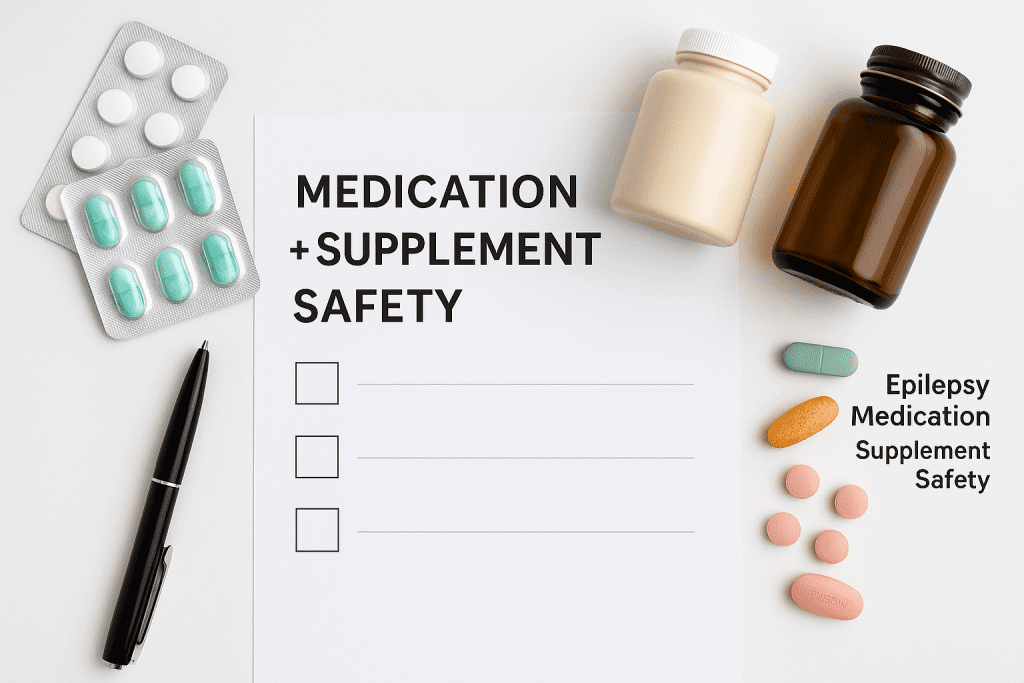
Evening primrose oil (EPO), a supplement rich in gamma-linolenic acid (GLA), is popular for its anti-inflammatory and hormonal-balancing effects. But if you’re taking seizure medications, you may wonder: is EPO safe? Some medical sources warn it might lower the seizure threshold, while emerging evidence suggests otherwise. This guide explores the science behind EPO, seizure meds, and the nuanced risks and recommendations for people managing epilepsy.
Quick Answer: Is Evening Primrose Oil Safe with Seizure Meds?
| Key Question | Summary Answer |
|---|---|
| Does EPO affect seizure threshold? | Some sources say yes; newer research challenges this claim |
| Main concern for people with epilepsy | Possible interaction or lowered seizure threshold |
| Known interactions with anticonvulsants | Minor or theoretical interactions with levetiracetam, pregabalin, and others |
| Should you consult a neurologist? | Yes — always before using EPO or any new supplement |
| Are safer alternatives available? | Possibly, depending on your therapeutic goal |
What Is Evening Primrose Oil and Why Is It Used?
Evening primrose oil is extracted from the seeds of the Oenothera biennis plant. Its primary active component is gamma-linolenic acid (GLA), an omega-6 fatty acid that contributes to prostaglandin production and supports hormonal balance and inflammation control.
It is commonly used to help with:
- PMS and menopausal symptoms
- Eczema and skin inflammation
- Rheumatoid arthritis
While often marketed as a natural remedy, its use alongside seizure medications raises important questions.
Conflicting Evidence: Does Evening Primrose Oil Trigger Seizures?
Concerns about EPO’s effect on seizure threshold emerged in the early 1980s, when case reports hinted at a potential risk. However, a more recent reappraisal, published in Prostaglandins, Leukotrienes, and Essential Fatty Acids, concluded that the seizure risk was likely “spurious”, with no reproducible mechanism or dose-response relationship.
The review also highlighted that both linoleic and gamma-linolenic acids may have protective neurological effects in animal models of epilepsy. Moreover, compounds like prostaglandin E1 (derived from EPO) were observed to exhibit anticonvulsant activity in preclinical studies.
Still, caution remains the mainstream recommendation. Institutions like the Mayo Clinic, Mount Sinai, and WebMD continue to advise against EPO for individuals with epilepsy due to the lack of large-scale human trials.
Drug Interactions: EPO and Common Anticonvulsants

Minor Documented Interactions
- Evening Primrose Oil and Pregabalin (Lyrica): Classified as a minor interaction on Drugs.com, but no clinical outcome data is available.
- Evening Primrose Oil and Levetiracetam (Keppra): There are alerts suggesting that EPO or borage oil could affect seizure control. While speculative, it’s recommended to monitor for loss of seizure control if using EPO alongside Keppra.
- Evening Primrose Oil and Carbamazepine: Another minor interaction noted in databases, lacking definitive clinical evidence.
Mechanistic Theories
Why might EPO interfere with seizure meds? Potential mechanisms include:
- Modulation of Prostaglandins: Prostaglandins affect neural excitability and may interact with how anticonvulsants modulate neurotransmission.
- Ion Channel Effects: EPO-derived arachidonic acid may alter sodium and calcium ion channels, key targets of many seizure drugs.
- GABAergic Interactions: Theoretically, GLA might influence GABA activity indirectly, affecting inhibitory balance in the brain.
Clinical Guidelines: What Do Experts Recommend?
There is no universal clinical guideline that specifically addresses evening primrose oil in epilepsy care. However, leading organizations offer useful principles:
- The Epilepsy Foundation advises that complementary therapies should never replace anti-seizure medications, and patients should inform their care team before adding any supplement.
- A 2007 paper recommended removing seizures as a listed side effect of EPO, arguing the evidence does not support such warnings. However, major institutions have not adopted this guidance, maintaining conservative language in their safety summaries.
- The Epilepsy Society recognizes the disagreement in the literature, citing the lack of consistent evidence.
When and How to Use EPO Safely (If At All)
If you’re considering EPO while on seizure meds, use the following risk-reduction strategies:
- Always Consult Your Neurologist Never begin a supplement like EPO without clearance. A specialist can assess whether your specific medication combo and seizure type increase risk.
- Start Low and Monitor Closely If approved, start with the lowest effective dose and track any changes in seizure frequency.
- Leverage Supplement Tracking Tools Consider using tools like our Cancer treatment supplement interaction checker or comparing methods like MyNetDiary vs. manual interaction tracking to help identify risky combinations and improve supplement safety.
- Reassess Often Regular follow-ups with your healthcare provider are essential to adjust either your supplements or meds as needed.
- Consider Alternatives Depending on the intended benefit (e.g., skin support, hormonal balance), your doctor may suggest a safer alternative supplement.
Key Takeaways
- EPO contains gamma-linolenic acid (GLA), a fatty acid that may influence inflammation and neural function.
- The seizure risk remains uncertain, with older warnings now under scrutiny, yet not reversed by most medical institutions.
- Drug interaction databases list minor to theoretical interactions between EPO and medications like pregabalin and levetiracetam.
- The best course of action is a personalized approach with physician input, careful monitoring, and access to trusted interaction tools.
Conclusion
Evening primrose oil’s interaction with seizure medications remains controversial. While some newer research suggests EPO may not lower the seizure threshold—and could even offer protective effects—many reputable institutions still advise against its use in people with epilepsy. Until larger, human-based trials provide clearer answers, those taking anticonvulsants should proceed with caution. When in doubt, consult your neurologist and rely on evidence-backed tools and personalized medical advice.
For more information about supplement safety and tracking, explore our Cancer treatment supplement interaction checker or learn about MyNetDiary vs. manual interaction tracking for smarter supplement management.

